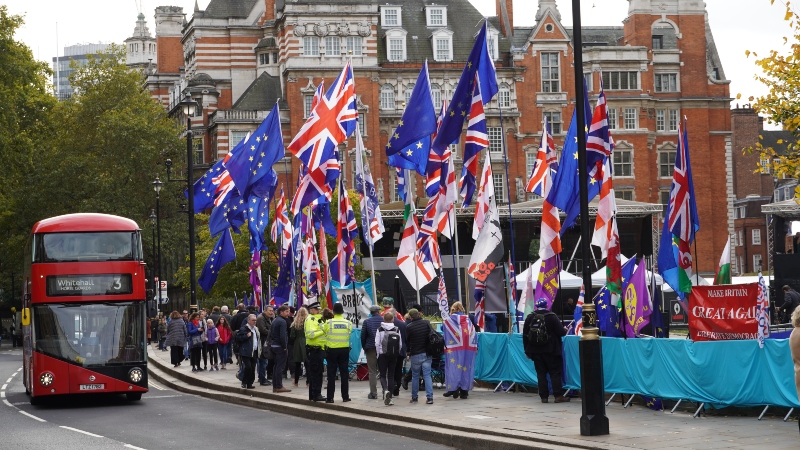 Jack Copley explains how the Callaghan and Thatcher governments in the late 1970s were concerned by the worsening performance of British industrial exporters, and so exchange control abolition constituted a strategy to depreciate sterling and boost export competitiveness.
Jack Copley explains how the Callaghan and Thatcher governments in the late 1970s were concerned by the worsening performance of British industrial exporters, and so exchange control abolition constituted a strategy to depreciate sterling and boost export competitiveness.
Exchange controls – restrictions on the purchase or sale of currencies – have been thoroughly delegitimised as an instrument of economic management amongst advanced capitalist states. A state’s implementation of exchange controls is generally seen as a sign of that economy’s ‘emerging’ status, a temporary measure to respond to a severe crisis, or an indication of a development model that radically diverges from contemporary liberal ‘best practice’. Indeed, Argentinian President Mauricio Macri’s dismantling of his country’s currency controls after his election in 2015 was intended to signal Argentina’s entry into the modern capitalist world after more than a decade of populist interventionism.
Yet this has not always been the case. Following the Second World War, exchange controls were commonly employed by states to manage the exchange rate and balance of payments, despite IMF rules that sought to phase them out. Such controls constituted an important instrument for states as they sought to reconcile the globally interconnected economic order of Bretton Woods with national democratic politics.
How did exchange controls fall so dramatically out of fashion? Political economy literature has tended to focus on two factors. Firstly, in the 1970s states began to compete to attract mobile capital flows by pursuing a deregulatory race to the bottom. Secondly, the rise of neoliberal ideas during this same period, within both national policy-making circles and international organisations, acted to stigmatise exchange controls and capital controls more generally.
Britain occupies a special place within this conventional explanation. The British abolition of exchange controls in 1979 was amongst the earliest deregulations of this kind, and thus acted as an important domino in the global dismantling of currency controls. Further, the British case is said to best exemplify the combined role of competition and ideology in motivating exchange control liberalisation, as this policy was supposedly driven by a competitive desire to promote the City of London as a global financial centre and the Thatcher government’s commitment to neoliberal principles.
My research challenges this dominant explanation of Britain’s scrapping of exchange controls. I argue that this radical deregulation, which was actually implemented in four stages from 1977-9 by the governments of James Callaghan and Margaret Thatcher, should be understood primarily as an ad hoc, pragmatic attempt to address the serious governing dilemmas generated by the stagflation crisis.
The British state faced two major problems in the late 1970s: rising inflation and low rates of profit. Additionally, sterling began to rise in value following the 1976 IMF bailout and the discovery of North Sea oil, which aided in the fight against inflation, but exacerbated the profitability crisis by further reducing the competitiveness of UK exports. In this context, the scrapping of exchange controls was a double-edged sword. By abandoning controls on the sale of sterling, the value of the pound could fall, which would aid British exporters; yet this would compound the problem of inflation by raising the price of imports. Archival evidence suggests that both the Callaghan and Thatcher governments prioritised the export competitiveness problem, at the expense of inflation. The potential benefits for the City of London and the influence of neoliberal ideology played secondary roles in motivating this deregulation.
However, two barriers stood in the way of this strategy to lower the value of the pound. First, the Trades Union Congress was strongly opposed to the liberalisation of exchange controls, as they saw exchange controls as an important element of a much needed industrial strategy. Second, in a context of floating exchange rates, any attempt to manufacture a depreciation of sterling could frighten money markets and result in a run on the pound.
The Callaghan government was ultimately impeded by these obstacles. The Labour Party’s close ties with the unions, combined with the fact that their incomes policy was already putting a terrible strain on their relations with the Trades Union Congress, meant that they were wary of further incensing the labour movement through an aggressive policy of exchange control liberalisation. Furthermore, Callaghan’s administration failed to come up with a strategy to pursue this competitive depreciation of the pound without spooking global markets and risking a sterling crisis. The result of this combination of pressures was Labour’s limited relaxation of exchange controls in October 1977 and January 1978.
The Thatcher government had much more success in pursuing this policy. The problem of an opposed trade union movement had significantly eased following the Winter of Discontent. Additionally, the Conservatives forged a rhetorical strategy that they believed would allow them to put downward pressure on the value of sterling without frightening global markets. Key members of the Thatcher government publicly declared that exchange control liberalisation was motivated purely by laissez-faire notions of responsible economic management, rather than a pragmatic desire to boost British exports.
This strategy was remarkably successful, with Thatcher’s supporters and critics united in their belief that this policy was indeed driven by a deep commitment to neoliberal principles. The government hoped that this discursive strategy would act to reassure currency markets, and thus allow for a gradual diversification of investment out of the pound, rather than a full sterling crisis, with the ultimate objective of easing the terrible pressure on UK exporting firms. Confident in the success of this strategy, Thatcher’s administration took a ‘leap in the dark’ in July and October 1979 by fully scrapping exchange controls.
The UK’s abolition of exchange controls is widely understood as a crucial juncture in the creation of a global economy in which capital flows freely across national borders. Yet this policy was not primarily designed to privilege the City of London’s business nor can it be simply categorised as an expression of Thatcher’s laissez-faire credentials. Rather, this liberalisation was pursued by both Conservative and Labour governments as a strategy to postpone the worst effects of the global economic crisis of the late 1970s by boosting the competitiveness of British exports through sterling depreciation.
__________
Note: the above draws on the author’s published work in the British Journal of Politics and International Relations.
 Jack Copley is Early Career Fellow at the Institute of Advanced Study, University of Warwick. His research interests include the political economy of financialisation, state theory, Marxism, and British politics. He has published in New Political Economy, British Journal of Politics and International Relations, Environment and Planning C, and Capital & Class.
Jack Copley is Early Career Fellow at the Institute of Advanced Study, University of Warwick. His research interests include the political economy of financialisation, state theory, Marxism, and British politics. He has published in New Political Economy, British Journal of Politics and International Relations, Environment and Planning C, and Capital & Class.







